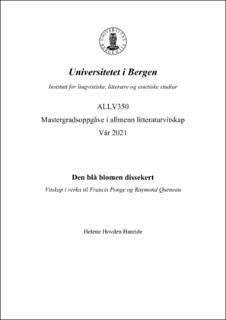Den blå blomen dissekert. Vitskap i verka til Francis Ponge og Raymond Queneau.
Master thesis
Permanent lenke
https://hdl.handle.net/11250/2736968Utgivelsesdato
2021-02-01Metadata
Vis full innførselSamlinger
- Master theses [274]
Sammendrag
This thesis explores the genre of scientific poetry. Once a flourishing fusion of scientific knowledge and poetic devices, the genre apparently suffered a decline from the 19th century onwards, and is now perceived as marginal. I discuss some possible explanations for this, before seizing on the potential implied by the scarcity of scholarly attention dedicated to this genre, namely the opportunity to explore neglected aspects of the works of major authors such as Raymond Queneau and Francis Ponge. Although critics have pointed out the scientific vein in the work of both these French authors earlier, this has typically not been further explored, or was labelled as a negative trait. Such is the case of Francis Ponge, who was criticized by philosopher Jean Paul Sartre for the intrusions of science in his seminal work Le parti pris des choses (1942), which, if it had not been for this, would have been perfectly compatible with the phenomenology Sartre advocated. I propose instead to read Ponge in light of German author and scientist Johann Wolfgang von Goethe’s preferred methodical approach, zarte Empirie. By focusing my analysis on the long prose poem “Faune et flore” I am also able to demonstrate the many parallels between Ponge’s text and Goethe’s scientific work in the field of botany. In the case of Raymond Queneau, the lack of critical attention devoted to his scientific long poem Petite Cosmogonie Portative (1950) is notorious compared to the wealth of readings his other work has generally solicited. In keeping with the thesis’s emphasis on botany I offer thorough readings of selected excerpts related to this field. I highlight the similarities between Queneau’s poem and the work usually identified as scientific poetry’s masterpiece: De rerum natura, by Roman poet Lucretius. Ultimately I go on to show how Petite Cosmogonie Portative can be understood as an early expression of a postmodern take on science, facilitated by the influence of Alfred Jarry’s ´pataphysique.
